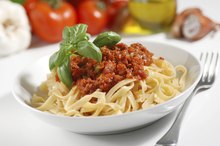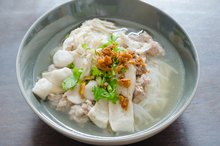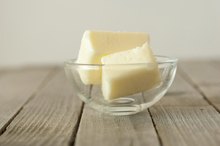Zero Net-Carb Foods
On a low-carb diet, you count grams of carbs instead of calories. Depending on the plan you select, your allotment might be anywhere from 20 to 130 grams of carbs per day. At the lower end of that range, you have to be especially careful about your food choices so you don’t exceed your daily allowance. The good news is that foods with zero net carbs don’t contribute to your carb total.
Net Carbs Defined
On a low-carb diet, you’re primarily concerned with limiting foods that raise your blood sugar significantly. Foods that are high in protein, fat and fiber and foods that are sweetened with sugar alcohols don’t spike blood sugar and are the best choices for this type of diet. You determine a food’s "net" carbs by subtracting grams of fiber or sugar alcohols from total carbohydrates. For example, if a food has 12 grams of carbs overall but 4 grams of fiber, it would have 8 grams of net carbs.
Recognized low-carb diets set your daily carb allowance based on these net carbs. So, for example, in the induction phase of Atkins, you take in only 20 grams of net carbs a day. You can either do the math yourself by consulting a catalog of nutrients, like the USDA database, or take the easy route and rely on a carb counter like the one provided by the Atkins website.
Zero Carbs in Protein Foods
What Can I Eat on a No Carb Diet?
Learn More
Carbs are found almost exclusively in plant foods, so most animal sources of protein -- meat, poultry and seafood -- have zero net carbs. Clear meat and poultry broths also have zero net carbs. Eggs have trace carbs -- less than half a gram of net carbohydrate per egg.
There are notable exceptions to this rule, however. Although fin fish have zero net carbs, shellfish do contain carbs -- anywhere from 1 to 6 grams in a serving. Breaded meats and fried fish have significant carbs, as do stuffed meats and fish. Deli and luncheon meats supply carbs, too, along with foods like hot dogs and sausage. A protein food cooked in a carb-heavy sauce, like beef stroganoff, will contain substantial carbs.
Zero Carbs in Fats
Butter, ghee, lard, vegetable oils and cooking sprays have zero net carbs. Some salad dressings are carb-free, too, but check the label to be sure there's no added sugar. Most cheeses contain small amounts of carbs -- 1 or 2 grams per ounce -- but a few provide zero net carbs. Carb-free cheeses include Emmenthaler, grated Romano and Parmesan, mascarpone, Stilton, havarti, queso blanco and fresh and smoked mozzarella.
Other Foods with Zero Net Carbs
Low-Carbohydrate & Low-Starch Foods
Learn More
You won’t find any vegetables, fruits, legumes, nuts, seeds or grains without carbs, but many leafy greens offer less than a gram per serving. However, you will find a few zero net-carb condiments, flavorings and herbs that you can add to your diet worry-free.
Vinegars like cider, red wine, ume plum, unsweetened rice and white have zero net carbs, so sprinkle them freely on your salad greens. A number of spices and seasonings, including fresh basil, celery salt, chili powder, curry powder, garlic salt, Italian seasoning, Thai chili paste and spicy brown mustard contain no net carbs.
In addition, artificial sweeteners and some of the sugar-free products made with them, like certain spreads and syrups, add no net carbs to your diet.
Related Articles
References
Writer Bio
Paula Martinac holds a Master of Science in health and nutrition education from Hawthorn University, with an emphasis on healthy aging, cancer prevention, weight control and stress management. She is Board Certified in holistic nutrition and a Certified Food and Spirit Practitioner, and has written extensively on nutrition for various websites.









